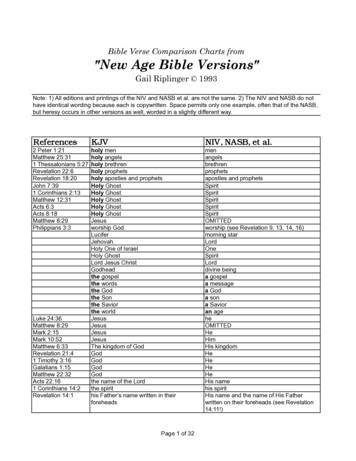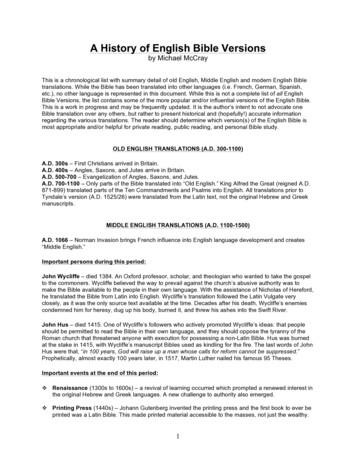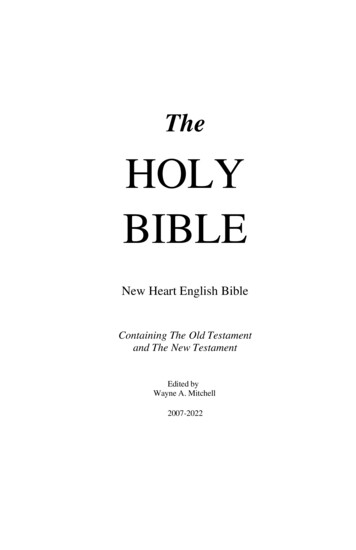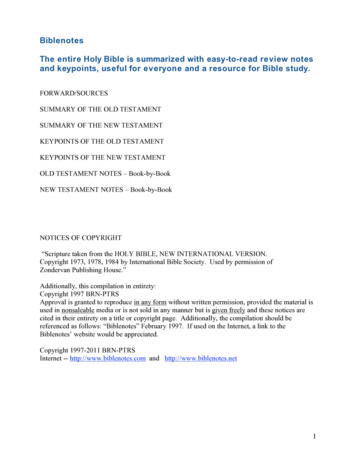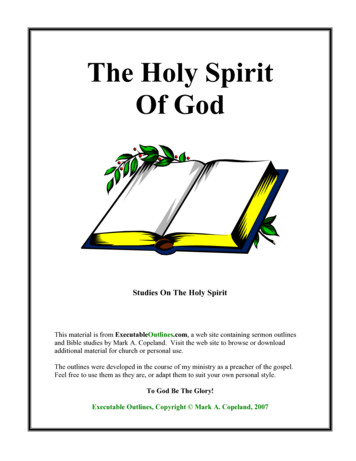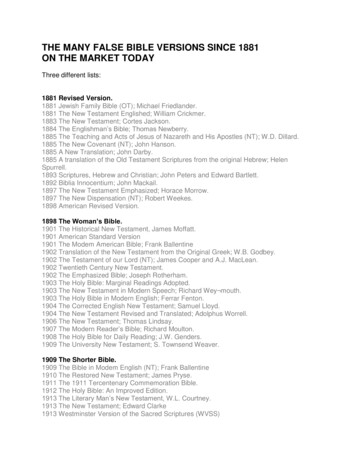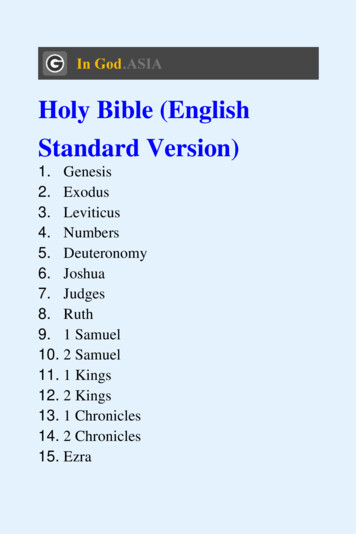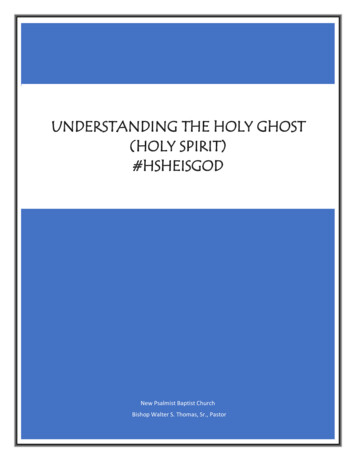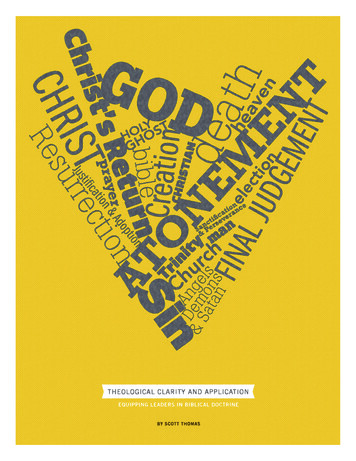
Transcription
Theological Clarity and Application: Equipping Leaders in Biblical DoctrineBy Scott ThomasInteractive Curriculum based on Wayne Grudem’s book, Christian Beliefs: Twenty Basics Every Christian Should Know (Grand Rapids: Zondervan,2005) with reference to Grudem’s Systematic Theology (Grand Rapids: Zondervan, 1994).Scott Thomas is the Director and the Chairman of the Board of Acts 29 Network. He serves as one of the five Executive Elders overseeingthe vision and mission of Mars Hill Church in Seattle. He served as a Lead Pastor of churches in Colorado and Idaho and as a youth pastor inColorado and Florida. Scott and Jeannie have two sons, Derrin and Dustin all residing in Seattle.Copyright 2009 by Scott ThomasUnless otherwise indicated, Scripture quotations are from the ESV Bible (The Holy Bible, English Standard Version ), copyright 2001 byCrossway Bibles, a publishing ministry of Good News Publishers. Used by permisison. All rights reserved.No part of this document may be reproduced separately. However, you are free to reproduce the book in its entirety for your purposes. You are notallowed to charge any costs or make any profits from this material as Scott Thomas provides it for the advancement of the gospel of Jesus Christ.Cover Design by Grant RowlestheResurgence.com
Endorsements“Paul’s first piece of advice to his hand-picked church planter Titus was to get elders in the churches in Crete.Church planters often ignore this advice to get many other important things done. This shouldn’t be. Scott Thomashas given us a valuable tool to help us develop men that “hold firm to the trustworthy word as taught” and are “ableto give instruction in sound doctrine and also to rebuke those who contradict it” (Titus 1:9). I look forward to usingthis book to develop elders to do those things.”Elliot GrudemEditor of Christian Beliefs“Scott Thomas’s guide to Grudem’s Christian Beliefs: Twenty Basics Every Christian Should Know, will undoubtedly stimulate discussion about these key doctrines and help drive home their importance to both new and matureChristians, church leaders and members, young and old alike. His questions are razor-sharp and don’t shy away fromdifficulties and mysteries provoked by these cardinal Christian beliefs.Dr. Gregg R. AllisonProfessor of Christian TheologyThe Southern Baptist Theological Seminary, Louisville, KY“With this resource, Scott Thomas provides a clear and helpful way to prepare believers for dealing with the difficultdoctrinal environment of our day. In this simple but effective guide, the leaders and members of your church can bechallenged to deepen their understanding of biblical doctrine through serious study and meaningful conversations.”Dr. Ed StetzerPresident of LifeWay Research“To provide compelling leadership for our churches, we need more than good intentions. We need strong theology.In Theological Clarity and Application Scott Thomas has provided us all with a rich resource as we grow together. Icommend his work enthusiastically.”Dr. Ray OrtlundImmanuel Church, Nashville“This is a fantastic resource to theologically develop Christian leaders. Biblical, simple, practical, and helpful.”Mark Driscoll, Pastor of Mars Hill ChurchFounder of Resurgence, President of Acts 29“Leaders in Christ’s church today must have more than a superficial knowledge of the faith. If they are to helpchurches contend for the faith once delivered to the saints, they must be steeped in Scripture and deep in theologicalinsight. Scott Thomas has provided a remarkable guide to assist leaders in their theological growth.”Dr. Alvin L. ReidProfessor of Evangelism and Student MinistryBailey Smith Chair of Evangelism, Southeastern Baptist Theological Seminary“An insightful and practical training manual that helps make systematic theology accessible for men who aspire to theoffice of elder.”Darrin PatrickVice President, Acts 29 NetworkPastor of The Journey Church St. Louis
Table of contents4PREFACE5INtroduction6Chapter 1 / what is the bible?9Chapter 2 / WHAT IS GOD LIKE?14Chapter 3 / What is the Trinity?17Chapter 4 / What is Creation?20Chapter 5 / what is prayer?23Chapter 6 / What are Angels, Demons, and Satan?25Chapter 7 / what is man?27Chapter 8 / What is Sin?30Chapter 9 / who is Christ?33Chapter 10 / WHat is the atonement?36Chapter 11 / What is the Resurrection?38Chapter 12 / What is election?41Chapter 13 / what does it mean to become a christian?44Chapter 14 / What are Justification and Adoption?47Chapter 15 / What are Sanctification and Perseverance?50Chapter 16 / What is death?52Chapter 17 / What is the church?55Chapter 18 / What Will Happen When Christ Returns?58Chapter 19 / What is the Final Judgement?61Chapter 20 / what is heaven?
PrefaceThis study guide is an interactive curriculum of the book, Christian Beliefs: Twenty Basics Every Christian ShouldKnow (Grand Rapids: Zondervan, 2005) written by Wayne A. Grudem and edited by Elliot Grudem.Christian Beliefs (160 pages) is a condensed version of Grudem’s book, Bible Doctrine (528 pages), and that itselfis a condensed version of Grudem’s award-winning Systematic Theology (1,290 pages).* This guide is designedto introduce Christians to the core beliefs of Bible doctrine in preparation for church leadership or to help newChristians to distinguish truth from error. This guide can be used to prepare elders, deacons, small group leaders,Sunday School teachers and all those who want to learn more about maturing in their Christian faith and becomingequipped to give a gentle and respectful answer to make a defense to anyone who asks you for a reason forthe hope that is in you (1 Peter 3:15). An instructor in a class or small group or in a one to one environment canfacilitate the questions or it can be utilized as a self-study or as a tool to equip a family in Biblical doctrine.Theological Clarity and Application seeks to preserve the contents of Grudem’s Christian Beliefs by using questionsto stimulate further understanding and application. The participants in this curriculum would benefit by first readingeach chapter in Christian Beliefs before answering questions. It is also highly recommended to have a respectedstudy Bible and a copy of Grudem’s Systematic Theology available for reference.Each chapter of this guide corresponds to the chapters in Christian Beliefs. At the end of each section, a prayertext and Scripture memory is included. Additionally, a reference to the corresponding chapters and supplementaryreadings in Grudem’s Systematic Theology are included as well as further readings by noted conservative scholarsand authors who contribute to the specific topic covered in the chapter.This material is not something that should be rushed through to complete. It is a refrigerated locker full of meat thatmust be eaten regularly and systematically one meal at a time, allowing ample time to chew and digest the informationand ideally to savor with others. One can complete the study in 20 weeks by covering one chapter a week orcomplete it in 40 weeks (approximately one school year) by covering one chapter every two weeks. The latter allowsfor a deeper reading of the accompanying Systematic Theology by Wayne Grudem.* Wayne Grudem, Bible Doctrine: Essential Teachings of the Christian Faith, ed. Jeff Purswell (Grand Rapids: Zondervan; Liecester, UK:Inter-Varsity Press, 1999) and Wayne Grudem, Systematic Theology: An Introduction to Biblical Doctrine (Grand Rapids: Zondervan;Liecester, UK: Inter-Varsity Press, 1994).4
IntroductionThe question I get asked most often by church planters and pastors of young churches is, “How can I train people inpreparation for leadership in the church?” We often point them to Wayne Grudem’s Systematic Theology—referredaffectionately among our tribe as simply, “Grudem’s.” Most people are not sure what to do with the nearly 1,300-pagebook with 57 chapters. The lay leaders with regular jobs are nearly traumatized when the 4-pound book arrives intheir mail!When Elliot Grudem gave me a copy of Christian Beliefs, I immediately identified a valuable resource to help pastorswalk their leaders and potential leaders through the excellent larger treatise. This interactive curriculum is an attemptto break down the doctrinal development of a person for Christian leadership into more granular, bite-sized chunkswith a fair reflection of Grudem’s full resource. This is still a huge undertaking in systematic theology. With thisresource, church leaders, pastors, small group leaders, bible study facilitators and student ministers can hopefullyequip people in Biblical doctrine in an interactive manner. The twenty lessons correspond chapter by chapter totwenty basics beliefs every Christian should know summarized in Grudem’s Christian Beliefs.Acts 29 believes that the gospel drives everything. In order to image the gospel properly, a gospel-centeredchurch must continually proclaim the Good News through Spirit-empowered leaders. For gospel multiplication, itis imperative that leaders are equipped in Biblical doctrine and churches must make a commitment to the ongoingtheological and missional development to faithfully follow the mission of God to all people groups.Jesus is the model leader. He rules through his Word and by his Spirit. God has gifted all His people, and he hascommissioned His followers to make disciples of all nations through the clear proclamation of His Word. No authorityexists in the church except that of the Word of God. The call to obey leaders in Hebrews 13:17 is a call to submitto the Word as it is rightly taught. The nature of leaders’ authority is that they herald the Word of God. The focalpoint for all of God’s people is that we are obedient to God’s Word and not primarily to the leaders. Leaders have tocommunicate the gospel and also live in step with the truth of the gospel (Gal. 2:14). The only authority in the churchis God’s Word. Jesus does not delegate His authority to leaders; He is still King Jesus ruling His church and He stillraises up leaders whose life and teaching come under His authority.Leadership is important, but it is leadership that gives expression to the continuing leadership over His peopleby King Jesus. Gospel leaders faithfully proclaim God’s Word as the authoritative principle in life and persistentlyconform to the cross-shaped leadership of Jesus Himself.May God use His Word to raise leaders who proclaim truth rightly for His own glory.Humbly submitted,Scott Thomas5
Chapter 1what is the bible?Key Texts2 Timothy 3:14-17But as for you, continue in what you have learned and have firmly believed, knowing from whom you learned itand how from childhood you have been acquainted with the sacred writings, which are able to make you wisefor salvation through faith in Christ Jesus. 16 All Scripture is breathed out by God and profitable for teaching, forreproof, for correction, and for training in righteousness, 17 that the man of God may be competent, equipped forevery good work.14152 Peter 3:14-1614Therefore, beloved, since you are waiting for these, be diligent to be found by him without spot or blemish, andat peace. 15 And count the patience of our Lord as salvation, just as our beloved brother Paul also wrote to youaccording to the wisdom given him, 16 as he does in all his letters when he speaks in them of these matters. Thereare some things in them that are hard to understand, which the ignorant and unstable twist to their own destruction,as they do the other Scriptures.2 Peter 1:16-2116For we did not follow cleverly devised myths when we made known to you the power and coming of our LordJesus Christ, but we were eyewitnesses of his majesty. 17 For when he received honor and glory from God theFather, and the voice was borne to him by the Majestic Glory, “This is my beloved Son, with whom I am wellpleased,” 18 we ourselves heard this very voice borne from heaven, for we were with him on the holy mountain.19And we have something more sure, the prophetic word, to which you will do well to pay attention as to a lampshining in a dark place, until the day dawns and the morning star rises in your hearts, 20 knowing this first of all, thatno prophecy of Scripture comes from someone’s own interpretation. 21 For no prophecy was ever produced by thewill of man, but men spoke from God as they were carried along by the Holy Spirit.6
Authority1. Critics argue that the Bible’s proof is based upon circular reasoning. Upon what is this accusation based?What do you think about this accusation?2. What are some other “authorities” in life that attempt to compete with the supreme authority of the Scriptures?3. Why are some things in the Bible difficult for you to believe or obey?Clarity1. How can we say that the Bible is clear, when Peter in the text above (2 Peter 3:14-16) says that some things init are “hard to understand”?2. What are some obstacles Grudem points to that prevent us from understanding Scripture rightly? Which one ismost difficult for you personally?3. What is the primary cause of your misunderstandings of Scripture?7
4. Compare 2 Timothy 2:15 with your ability to “accurately” handle the word of truth.5. At times, experts and seminary professors disagree on the interpretations of Scripture and church memberswonder what hope there is to truly understand Scripture. How does the doctrine of the clarity of Scripture helpguard against that temptation?Necessity1. List some things you would know about God without the aid of Scripture?2. List some things that you would have no way of knowing without the Scriptures?3. Explain the difference between general revelation and specific revelation? What texts can you give in support ofyour explanation?4. If food is necessary for physical well-being, the Scriptures are likewise necessary for spiritual well-being. Whatmakes us so spiritually insensitive that we feel physical hunger much more acutely than spiritual hunger? Whatis the remedy for you personally?8
Sufficiency1. Grudem says the Bible is sufficient. What three generalities does he cite?2. What topic do you wish that the Bible would say more than it does? What is at the root of this desire? Howshould the teaching on sufficiency affect this desire?3. What does Grudem mean by “humble hesitancy”? In what way do you characterize this approach to the Bible?Prayer TextPray through the following text in light of this chapter:Psalm 19For the choir director. A Psalm of David.1The heavens declare the glory of God, and the sky above proclaims his handiwork. 2 Day to day pours out speech,and night to night reveals knowledge. 3 There is no speech, nor are there words, whose voice is not heard. 4 Theirvoice goes out through all the earth, and their words to the end of the world. In them he has set a tent for the sun, 5which comes out like a bridegroom leaving his chamber, and, like a strong man, runs its course with joy. 6 Its risingis from the end of the heavens, and its circuit to the end of them, and there is nothing hidden from its heat. 7 Thelaw of the Lord is perfect, reviving the soul; the testimony of the Lord is sure, making wise the simple; 8 the preceptsof the Lord are right, rejoicing the heart; the commandment of the Lord is pure, enlightening the eyes; 9 the fear ofthe Lord is clean, enduring forever; the rules of the Lord are true, and righteous altogether. 10 More to be desired arethey than gold, even much fine gold; sweeter also than honey and drippings of the honeycomb. 11 Moreover, by themis your servant warned; in keeping them there is great reward. 12 Who can discern his errors? Declare me innocentfrom hidden faults. 13 Keep back your servant also from presumptuous sins; let them not have dominion over me!Then I shall be blameless, and innocent of great transgression. 14 Let the words of my mouth and the meditation ofmy heart be acceptable in your sight, O Lord, my rock and my redeemer.Scripture Memory2 Timothy 3:16All Scripture is breathed out by God and profitable for teaching, for reproof, for correction, and for trainingin righteousness.9
Supplementary Readings inSystematic TheologyAuthoritypp. 73-85.Claritypp. 105-111.Necessitypp. 116-126.Sufficiencypp. 127-136.Further ReadingsMeredith G. Kline, The Structure of Biblical Authority (Grand Rapids: Eerdmans, 1975).D. A. Carson and John Woodbridge, eds., Hermeneutics, Authority, and Canon (Grand Rapids: Zondervan, 1986).G. K. Beale, The Erosion of Inerrancy in Evangelicalism: Responding to New Challenges to Biblical Authority(Wheaton: Crossway, 2008).Noel Weeks, The Sufficiency of Scripture (Carlisle, Pa.: Banner of Truth, 1988).R. C. Sproul, Scripture Alone: The Evangelical Doctrine, (P & R Publishing, 2005).Graeme Goldsworthy, Gospel-Centered Hermeneutics: Foundations and Principles of Evangelical Interpretation(Downers Grove, IL: IVP Academic, 2007).10
Chapter 2WHAT IS GOD LIKE?Key TextsPsalm 102:25-28Of old you laid the foundation of the earth, and the heavens are the work of your hands. 26 They will perish, butyou will remain; they will all wear out like a garment. You will change them like a robe, and they will pass away,27but you are the same, and your years have no end. 28 The children of your servants shall dwell secure; theiroffspring shall be established before you.25Exodus 34:6-7The LORD passed before him and proclaimed, “The LORD, the LORD, a God merciful and gracious, slow to anger,and abounding in steadfast love and faithfulness, 7 keeping steadfast love for thousands, forgiving iniquity andtransgression and sin, but who will by no means clear the guilty, visiting the iniquity of the fathers on the childrenand the children’s children, to the third and the fourth generation.”6God Exists1. Why do some people deny the existence of God?2. Is there any difference between the evidence in Scripture and the evidence in nature for God’sexistence? Explain.11
God Is Knowable1. What is the difference between incomprehensible and knowable as it relates to what we can know aboutGod? How can God be both?2. How would you answer this objection– “Claiming to know God is presumptuous; humility acknowledges thatwe cannot truly know Him?”God Is Independent1. Explain and answer this objection: “If God was really independent, why does the Bible seem to always beg forhuman devotion and obedience?”God Is Unchangeable1. What are some ways that the Scriptures speak of God changing? Does this violate His being unchangeable?2. If God does not change, why is our prayer for Him to change something in our life meaningful?12
God Is Eternal1. God is eternal. Why does this matter to you? What kind of perspective does this give you on your ministry?2. How is time relative to God’s existence? Explain using texts.God Is Omnipresent1. If God is separate from His creation and time, how can He be present in it?2. Explain how the omnipresence of God can be both a comforting and a terrorizing thought.God Is Spirit1. What are the practical implications of worshipping God in Spirit?13
God Is Invisible1. According to the Bible, has anybody ever seen God in any form?2. Will anybody ever see God? Explain.God Is Omniscient1. How vast is the knowledge of God (Psalm 139)?2. What ideas come to mind as one realizes that nothing is hidden from God (Heb. 4:13)?God Is Wise1. What is the difference between God being all-knowing and being all-wise?2. What does 1 Corinthians 1:24 mean when it says that Christ is the “wisdom of God?”14
God Is Truthful1. What is the risk in denying that God is always truthful?God Is Good1. What are some unbiblical ways to define “good”? How can the Bible correct these perspectives? How doesthis affect our attempt to do good things?2. Answer this objection: “If God is good, why do people suffer?” Use texts.God Is Love1. What evidence in the Bible do we have for God’s love?2. What do you think about the love extended to us even as we rebel against God?15
God Is Holy1. Define holiness according to the Bible. Provide texts.2. What does it mean to “share in” God’s holiness (Heb. 12:10)? How should this affect ourperspective on sanctification?God Is Righteous and Just1. What are the differences between righteousness and justice?2. Is God more loving than he is just? Explain.3. How are love and justice expressed through the person of Jesus?God Is Jealous1. What does it mean when the Bible speaks of God as jealous?16
2. How is God’s jealousy justified?God Is Wrathful toward Sin1. Is God’s wrath simply directed toward sin, or is it also directed against sinners? Explain using texts.2. In what ways is it right for us to imitate this wrath, and in what ways is it wrong for us to do so?God Wills What He Will1. What is the difference between God’s secret will and his revealed will?2. List one common misconception regarding “God’s will” and answer it from Scripture.God Has Freedom1. What is God free to do? Provide a Bible text to support your answer.17
2. How does this relate to our desire to find out “why” God acts in certain ways? How can you explain thispastorally to someone who is suffering?God Is Omnipotent1. What is the extent of God’s power?2. What does 1 Corinthians 1:24 mean when it says that Christ is the “power of God”?God Is Perfect1. How does God’s perfection relate to our sanctification?2. To what extent can we really “be perfect as God is perfect” (Matt 5:48)?God Is Blessed1. If God fully delights in himself, how is this not vanity or egotism?18
2. How could you personally delight in the things of God?God Is Beautiful1. How can the beauty on earth point us toward God?2. How can it point us away from Him?God Is Unity1. How do the attributes of God compare with His other attributes?Prayer TextPray through the following text in light of this chapter:Psalm 139To the choirmaster. A Psalm of David.O LORD, you have searched me and known me! 2 You know when I sit down and when I rise up; you discern mythoughts from afar. 3 You search out my path and my lying down and are acquainted with all my ways. 4 Even beforea word is on my tongue, behold, O LORD, you know it altogether. 5 You hem me in, behind and before, and lay yourhand upon me. 6 Such knowledge is too wonderful for me; it is high; I cannot attain it. 7 Where shall I go from yourSpirit? Or where shall I flee from your presence? 8 If I ascend to heaven, you are there! If I make my bed in Sheol,you are there! 9 If I take the wings of the morning and dwell in the uttermost parts of the sea, 10 even there your handshall lead me, and your right hand shall hold me. 11 If I say, “Surely the darkness shall cover me, and the light aboutme be night,” 12 even the darkness is not dark to you; the night is bright as the day, for darkness is as light with you.13For you formed my inward parts; you knitted me together in my mother’s womb. 14 I praise you, for I am fearfullyand wonderfully made. Wonderful are your works; my soul knows it very well. 15 My frame was not hidden from19
you, when I was being made in secret, intricately woven in the depths of the earth. 16 Your eyes saw my unformedsubstance; in your book were written, every one of them, the days that were formed for me, when as yet there werenone of them. 17 How precious to me are your thoughts, O God! How vast is the sum of them! 18 If I would countthem, they are more than the sand. I awake, and I am still with you. 19 Oh that you would slay the wicked, O God! Omen of blood, depart from me! 20 They speak against you with malicious intent; your enemies take your name in vain!21Do I not hate those who hate you, O LORD? And do I not loathe those who rise up against you? 22 I hate themwith complete hatred; I count them my enemies. 23 Search me, O God, and know my heart! Try me and know mythoughts! 24 And see if there be any grievous way in me, and lead me in the way everlasting!Scripture MemoryExodus 34:6-7The LORD passed before him and proclaimed, “The LORD, the LORD, a God merciful and gracious, slow toanger, and abounding in steadfast love and faithfulness, 7 keeping steadfast love for thousands, forgiving iniquityand transgression and sin, but who will by no means clear the guilty, visiting the iniquity of the fathers on thechildren and the children’s children, to the third and the fourth generation.”6Supplementary Readings inSystematic TheologyGod Existspp. 141-148.God Is Knowablepp. 149-155.God Is Independentpp. 160-163.God Is Unchangeablepp. 163-168.God Is Eternalpp. 168-173.God Is Omnipresentpp. 173-177.God Is SpiritGod Is Omniscientpp. 190-193.God is Wrathful toward Sinpp. 206-207.God Is WiseGod Wills What He Willpp. 193-195.pp. 211-216.God Is Truthfulpp. 195-197.God Has Freedompp. 216.God Is GoodGod Is Omnipotentpp. 197-199.pp. 216-218.God Is LoveGod Is Perfectpp. 199-200.pp. 218.God Is HolyGod Is Blessedpp. 202-203.pp. 218-219.God Is Righteous and Justpp. 186-188.pp. 204-205.God Is InvisibleGod Is Jealouspp. 188-190.pp. 205-206.God Is Unitypp. 177-181.Further ReadingsA. W. Tozer, The Knowledge of the Holy (New York: Harper and Row, 1961).John Piper, The Pleasures of God: Mediations on God’s Delight in Being God (Sisters, Ore.: Multnomah, 2000).John Piper, Desiring God: Mediations of a Christian Hedonist (Sisters, Ore.: Multnomah, 2003).J. I. Packer, Knowing God (Downers Grove, Il.: IVP, 1993).20
Chapter 3What is the Trinity?Key TextsMatthew 3:16-17And when Jesus was baptized, immediately he went up from the water, and behold, the heavens were opened tohim, and he saw the Spirit of God descending like a dove and coming to rest on him; 17 and behold, a voice fromheaven said, “This is my beloved Son, with whom I am well pleased.16Matthew 28:19Go therefore and make disciples of all nations, baptizing them in the name of the Father and of the Son and ofthe Holy Spirit.Three EssentialsGod Is Three PersonsEach Person Is Fully GodThere Is One God1. What are some texts in the Old Testament that imply plurality in God? How do we reconcile this with thestrong monotheism found in the Old Testament?2. What are some texts in the New Testament that imply plurality in God?21
3. What leads people to believe that the Spirit is some “power” or “force” and not a distinct person? Whatmakes such a belief unscriptural?4. What are some ways to affirm not only the distinctness but also the divinity of the Holy Spirit?5. What are some examples of religious worldviews that illustrate the following errors concerning the threeessentials of the Trinity?a. Denying that God is three persons:b. Denying that each person of the Trinity is fully God:c. Denying that there is one God:6. What are passages in the New Testament that echo the monotheism found in the Old Testament?22
7. If the Trinity is as central as we claim, why did Jesus not talk about it explicitly? Why didn’t the Apostles talkabout it explicitly?8. What is lost in denying the doctrine of the Trinity?Distinct Roles1. What are some roles that are clearly distinct for each Person of the Trinity? List texts to support your answer.a. Father:b. Son:c. Holy Spirit:23
2. What are specific distinctions between the persons of the Trinity in their roles in creation and redemption?Unity and Diversity1. Why doesn’t the submission of the Son to the Father imply a difference in essence between the Father andthe Son? Are both equally God in every sense?2. How do the different ways the Father, Son, and Holy Spirit relate to one other provide us with a model for theways we relate to each other?Prayer TextPray through the following text in light of this chapter:Ephesians 1:3-14Blessed be the God and Father of our Lord Jesus Christ, who has blessed us in Christ with every spiritualblessing in the heavenly places, 4 even as he chose us in him before the foundation of the world, that we shouldbe holy and blameless before him. In love 5 he predestined us for adoption through Jesus Christ, according tothe purpose of his will, 6 to the praise of his glorious grace, with which he has blessed us in the Beloved. 7 In himwe have redemption through his blood, the forgiveness of our trespasses, according to the riches of his grace,8which he lavished upon us, in all wisdom and insight 9 making known to us the mystery of his will, accordingto his purpose, which he set forth in Christ 10 as a plan for the fullness of time, to unite all things in him, thingsin heaven and things on earth. 11 In him we have obtained an inheritance, having been predestined according tothe purpose of him who works all things according to the counsel of his will, 12 so that we who were the first tohope in Christ might be to the praise of his glory. 13 In him you also, when you heard the word of truth, the gospelof your salvation, and believed in him, were sealed with the promised Holy Spirit, 14 who is the guarantee of ourinheritance until we acquire possession of it, to the praise of his glory.3Scripture MemoryMatthew 28:19Go therefore and make disciples of all nations, baptizing them in the name of the Father and of the Son and ofthe Holy Spirit.24
Supplementary Readings inSystematic TheologyThree Essentialspp. 226-248.Distinct Roles/Unity and Diversitypp. 248-257.Further ReadingsBruce Ware, Father, Son, and Holy Spirit: Relationship, Roles and Relevance (Wheaton: Crossway, 2005).Robert Letham, The Holy Trinity: In Scripture, History, Theology and Worship (Philipsburg, NJ: P & RPublishing, 2005).25
Chapter 4What is Creation?Key TextsPsalm 148:1-6Praise the Lord! Praise the Lord from the heavens; praise him in the heights! 2 Praise him, all his angels; praisehim, all his hosts! 3 Praise him, sun and moon, praise him, all you shining stars! 4 Praise him, you highest heavens,and you waters above the heavens! 5 Let them praise the name of the Lord! For he commanded and they werecreated. 6 And he established them forever and ever; he gave a decree, and it shall not pass away.1Colossians 1:15-17He is the image of the invisible God, the firstborn of all creation. 16 For by him all thi
Christian Beliefs (160 pages) is a condensed version of Grudem’s book, Bible Doctrine (528 pages), and that itself is a condensed version of Grudem’s award-winning Systematic Theology (1,290 pages).* This guide is designed to introduce Christians to the core beliefs of Bible doc
